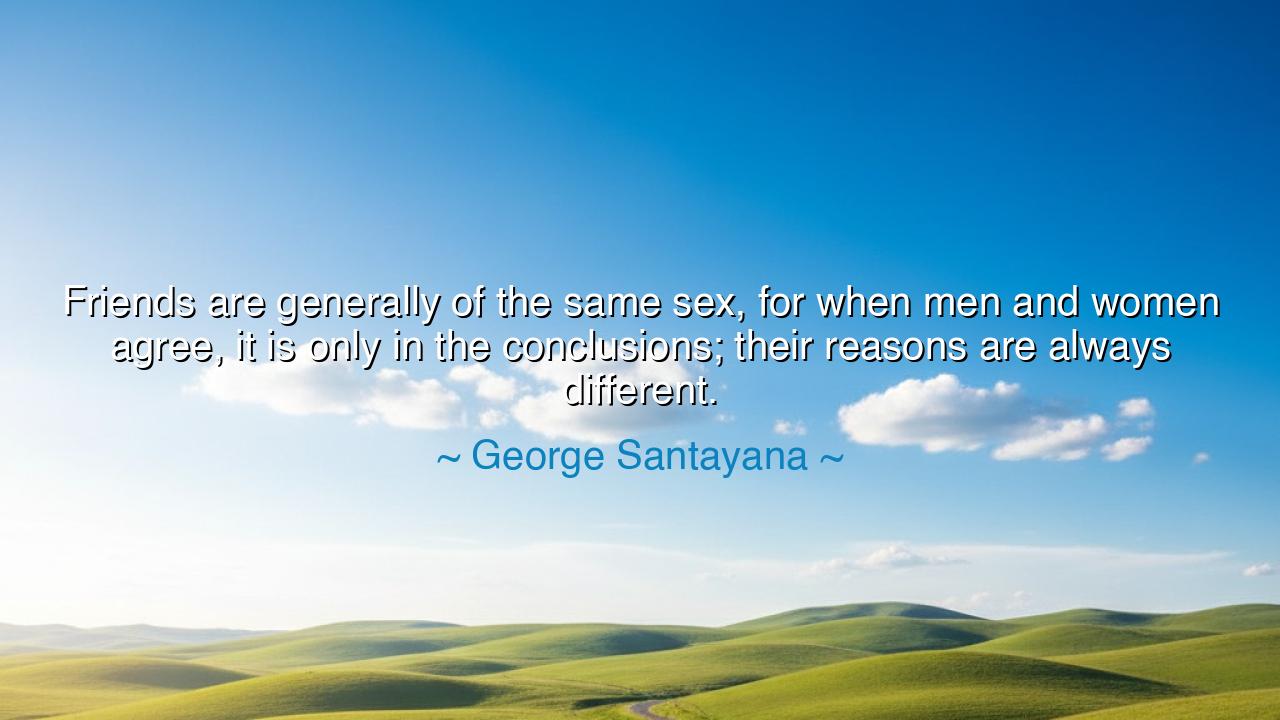
Friends are generally of the same sex, for when men and women
Friends are generally of the same sex, for when men and women agree, it is only in the conclusions; their reasons are always different.






The words of George Santayana, “Friends are generally of the same sex, for when men and women agree, it is only in the conclusions; their reasons are always different,” strike with both wit and depth. He observes not only the habits of human companionship but also the mystery of how the two sexes perceive the world. In his vision, friendship thrives where thought is familiar and reasoning is aligned, yet between man and woman, though agreement may be reached, the journey of thought differs so greatly that it often hinders the intimacy of true camaraderie.
The origin of such a reflection lies in centuries of observation. Philosophers, poets, and sages before Santayana often remarked on the separateness of the male and female experience. Men and women are shaped by different roles, expectations, and even ways of reasoning, handed down by both nature and society. Thus, while they may arrive at the same conclusion—justice, truth, love—their pathways differ, one built by certain struggles, the other by entirely different ones. This divergence makes them allies, but not always companions of the closest kind.
Consider the story of Socrates and Aspasia. Socrates, the philosopher of Athens, was said to admire Aspasia for her wisdom and her mind, and though they agreed on many matters, their ways of approaching truth diverged. Aspasia, as a woman, saw the world through the lens of her exclusion and her subtle influence in politics, while Socrates spoke from the stage of public discourse and the masculine realm of the agora. Their reasons differed, though their conclusions often aligned. It was respect, not sameness, that bound them.
Santayana’s words also reveal the nature of friendship itself. True friendship is forged not merely in agreement, but in shared reasoning, in the ability to trace thought together along the same path. When two souls reason alike, they feel as though they see with the same eyes and hear with the same ears. But when reasoning differs, even harmony of outcome may not create the same intimacy. Thus, friends often emerge among those who share not just conclusions, but the same manner of reaching them.
Yet, his statement must also be read as both observation and challenge. If men and women walk separate paths of reasoning, it is not necessarily because nature decrees it so, but because society has long taught them to think differently. Men were raised to reason by conquest, women by survival and empathy; men by assertion, women by subtlety. Thus, their reasons grew apart, not by destiny, but by tradition. This makes Santayana’s insight poignant, but also a call to reflect on how these divisions might be overcome.
The lesson, then, is not to despair at difference, but to recognize its beauty. In friendship, seek those who share your reasoning, for they will walk closely with you. But in love, in partnership, or in collaboration, embrace those whose reasoning differs, for they will reveal what you cannot see. Agreement in conclusions may unite hearts, but difference in reasoning can sharpen minds and broaden vision.
Practical actions flow from this truth: value your closest friends, who think as you do, for they are the mirrors of your own soul. Yet also honor those who differ, especially those of the opposite sex, for they are the windows into another way of knowing the world. Do not dismiss the unfamiliar reasoning of others as folly; instead, ask what truth it holds that your own reasoning misses.
Let future generations remember: men and women may not always walk the same path of thought, but when their roads converge at the same conclusions, the world is enriched. Seek friendship where your hearts and minds align, and seek wisdom where they diverge. For in the balance between sameness and difference lies the fullness of human understanding.






AVNguyen Ngoc Anh Vy
This quote suggests that men and women can agree on conclusions, but their reasons are always different. Could this be a limitation in how we understand each other’s viewpoints, or is it more of an opportunity to appreciate different ways of thinking? How can we bridge the gap between these different forms of reasoning and create more understanding between the sexes?
APTram Anh Pham
I find George Santayana’s view about the inherent differences in reasoning between men and women quite thought-provoking. But can this generalization be applied to everyone? Aren’t there instances where men and women think similarly, and the only difference is their unique perspectives rather than gender? How do we avoid oversimplifying complex human experiences based on gender?
HAPham Nguyen Ha Anh
This quote intrigues me because it touches on how men and women communicate differently. I wonder, though, if these differences in reasoning always lead to conflict, or can they sometimes be complementary? Do we need to embrace these differences, or should we aim for more common ground in understanding each other?
Dduong
George Santayana's quote seems to suggest that while men and women may reach similar conclusions, their thought processes are inherently different. Is this a reflection of biological differences, or is it shaped more by social conditioning and cultural norms? Can it be that these differences add value to conversations, or does it create unnecessary tension in relationships?